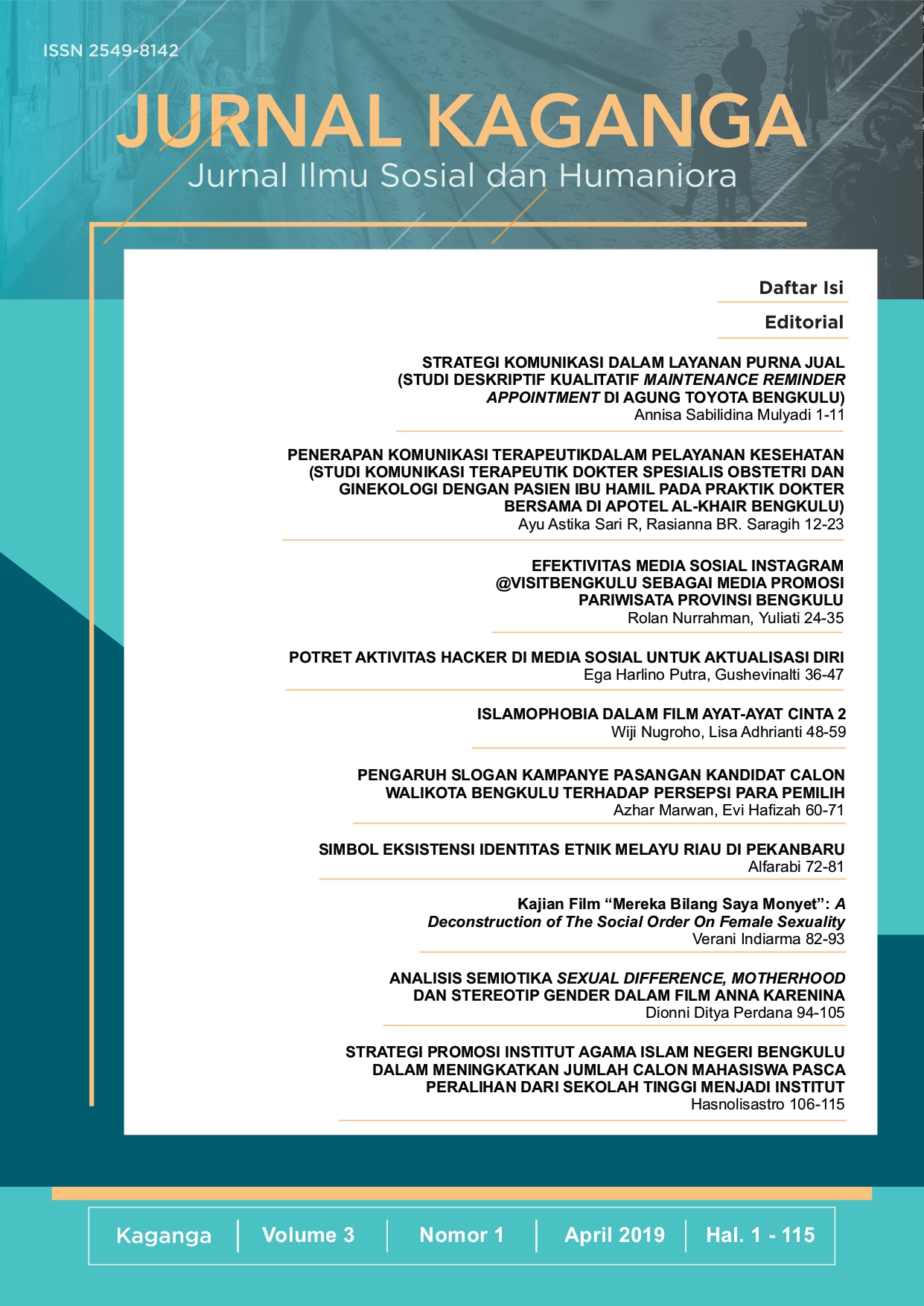Main Article Content
Abstract
Keywords
Article Details
Copyright (c) 2019 Verani Indiarma

This work is licensed under a Creative Commons Attribution-ShareAlike 4.0 International License.
Silakan temukan hak dan lisensi di Jurnal KAGANGA: Jurnal Ilmu Sosial dan Humaniora
1. Lisensi
Penggunaan artikel ini akan diatur oleh lisensi Atribusi Creative Commons seperti yang saat ini ditampilkan pada Lisensi Internasional Creative Commons Attribution-ShareAlike 4.0.
2. Jaminan Penulis
Penulis menjamin bahwa artikel tersebut asli, ditulis oleh penulis lain, belum diterbitkan sebelumnya, tidak mengandung pernyataan yang melanggar hukum, tidak melanggar hak orang lain, tunduk pada hak cipta yang dipegang secara eksklusif oleh penulis dan bebas dari setiap hak pihak ketiga, dan bahwa setiap izin tertulis yang diperlukan untuk mengutip dari sumber lain telah diperoleh oleh penulis.
3. Hak Pengguna
Jurnal KAGANGA: Ilmu Ilmu Sosial dan Humaniora adalah semangat untuk menyebarluaskan artikel yang diterbitkan sebebas mungkin. Di bawah lisensi Creative Commons, Jurnal KAGANGA memungkinkan pengguna untuk menyalin, mendistribusikan, menampilkan, dan melakukan pekerjaan hanya untuk tujuan komersial. Pengguna juga perlu mengaitkan penulis dan Jurnal KAGANGA untuk mendistribusikan karya dalam jurnal.
4. Hak Penulis
Penulis memiliki hak-hak berikut:
Hak cipta, dan hak kepemilikan lainnya yang berkaitan dengan artikel, seperti hak paten, Hak untuk menggunakan substansi artikel dalam karya masa depan, termasuk ceramah dan buku, Hak untuk mereproduksi artikel untuk tujuan sendiri, Hak untuk mandiri arsipkan artikel tersebut, hak untuk mengadakan perjanjian kontrak tambahan yang terpisah untuk distribusi non-eksklusif dari versi artikel yang diterbitkan (mis., mempostingnya ke repositori institusional atau menerbitkannya dalam sebuah buku), dengan pengakuan atas publikasi awalnya di jurnal ini (Jurnal KAGANGA: Ilmu Sosial dan Humaniora).
5. Co-Authorship
Jika artikel tersebut disusun bersama oleh penulis lain, penandatangan formulir ini menjamin bahwa ia telah diberi wewenang oleh semua penulis bersama untuk menandatangani perjanjian ini atas nama mereka, dan setuju untuk memberi tahu rekan penulisnya tentang ketentuan persetujuan ini.
6. Pengakhiran
Perjanjian ini dapat diakhiri oleh penulis atau Jurnal KAGANGA: Ilmu Sosial dan Humaniora setelah pemberitahuan dua bulan di mana pihak lain secara material telah melanggar perjanjian ini dan gagal untuk memperbaiki pelanggaran tersebut dalam waktu sebulan setelah diberikan pemberitahuan oleh pihak yang mengakhiri. meminta pelanggaran tersebut untuk diatasi. Tidak ada pelanggaran atau pelanggaran perjanjian ini yang akan menyebabkan perjanjian ini atau lisensi apa pun yang diberikan di dalamnya untuk berakhir secara otomatis atau mempengaruhi definisi Jurnal KAGANGA: Ilmu Sosial dan Humaniora
7. Royalti
Perjanjian ini memberikan hak kepada penulis untuk tidak ada royalti atau biaya lainnya. Sejauh diizinkan secara hukum, penulis melepaskan haknya untuk mengumpulkan royalti relatif terhadap artikel sehubungan dengan setiap penggunaan artikel oleh Jurnal KAGANGA: Ilmu Sosial dan Humaniora atau sublisensi-nya.
8. Lain-lain
Jurnal KAGANGA: Ilmu Sosial dan Humaniora akan menerbitkan artikel (atau menerbitkannya) di jurnal jika proses editorial artikel berhasil diselesaikan dan Jurnal KAGANGA atau sublisensi-nya telah berkewajiban untuk memiliki artikel yang diterbitkan. Jurnal KAGANGA dapat mengkonfirmasi artikel dengan gaya tanda baca, ejaan, huruf besar, referensi dan penggunaan yang dianggap tepat. Penulis mengakui bahwa artikel tersebut dapat dipublikasikan sehingga dapat diakses oleh publik dan akses tersebut akan gratis bagi pembaca.
References
- Alfayyadl, Muhammad.(2012). Derrida.Yogyakarta.LkiS Yogyakarta Bordo, S. (1993) Feminism, Foucault and the Politics of the Body, in C ramazanoglu (ed) Up Against Foucault: Explorations of Some Tensions Between Foucault and Feminism, London/New York: Routledge Brooks, Ann. (2004). Terjemahan S. KuntoAdiWibowo. Posfeminisme& Cultural Studies Yogyakarta.Jalasutra Carrete, Jeremy R. (2011). Agama, Seksualitas, Kebudayaan.Yogyakarta.Jalasutra
- Eriyanto. 2001. AnalisisWacana: PengantarAnalisisTeks Media. Yogyakarta. Faludi, S. (1992) Backlash, London: Vintage Foucault, Michel.(2008).La Volonte de Savoir, Histoire de La Sexualite (InginTahuSejarahSeksualitas). Jakarta: YayasanObor Indonesia. Gamble, Sarah. (2010) Feminisme&Postfeminisme.Yogyakarta.Jalasutra
- Gunawan, FX Rudy. (2000) MendobrakTabu: Sex, KebudayaandanKebejatanManusia. Yogyakarta.Galang Press Pilliang, Yasraf Amir. (2003) Hipersemiotika.Tafsir cultural studies atasmatinyamakna. Bandung. Jalasutra. Rahariyoso, Dwi. (2017). KonstruksiTubuhjokoPinurbo.RuangPascakolonial di BalikCelanadan Di BawahKibaranSarung.Yogyakarta.Araska Reinharz, Shulamit. (1992). Metode-MetodeFeminisdalamPenelitianSosial.PenterjemahLisabonaRahman. Jakarta: Women Research Institute Subandy, Idi Ibrahim. (2007)Budaya Popular SebagaiKomunikasi, Yogyakarta.Jalasutra Synott, Anthony. (2003) Tubuhsosial.Simbolisme, DiridanMasyarakat.Yogyakarta.Jalasutra Upstone, Sara. (2009). Spatial Politics in the Postcolonial Novel.Ashgate Publishing Company E-Journal Kim, L.S. 2001. Sex and Single Girl in Postfeminism: The F Word in Television, in Television and New Media, Vol.2, No.4. https://scihub.io/http://journals.sagepub.com/doi/abs/10.1177/152747640100200403?journalCode=tvna
- Colson, Marie. 2015. Female orgasm; myths, fact, and controversies. In Elsevier Masson.Sexologies. 19. 8-14. 10.1016/j.sexol.2009.11.004. https://www.researchgate.net/publication/247335877_Female_orgasm_Myths_facts_and_controversies
- Gwyne, Joel and Nadine Muller. 2014. Postfeminism and Contemporary Hollywood Cinema in Elsevier. Palgrave Macmillan. Volume 44, pages 198-199.
- https://www.sciencedirect.com/science/article/abs/pii/S0277539514000259
References
Alfayyadl, Muhammad.(2012). Derrida.Yogyakarta.LkiS Yogyakarta Bordo, S. (1993) Feminism, Foucault and the Politics of the Body, in C ramazanoglu (ed) Up Against Foucault: Explorations of Some Tensions Between Foucault and Feminism, London/New York: Routledge Brooks, Ann. (2004). Terjemahan S. KuntoAdiWibowo. Posfeminisme& Cultural Studies Yogyakarta.Jalasutra Carrete, Jeremy R. (2011). Agama, Seksualitas, Kebudayaan.Yogyakarta.Jalasutra
Eriyanto. 2001. AnalisisWacana: PengantarAnalisisTeks Media. Yogyakarta. Faludi, S. (1992) Backlash, London: Vintage Foucault, Michel.(2008).La Volonte de Savoir, Histoire de La Sexualite (InginTahuSejarahSeksualitas). Jakarta: YayasanObor Indonesia. Gamble, Sarah. (2010) Feminisme&Postfeminisme.Yogyakarta.Jalasutra
Gunawan, FX Rudy. (2000) MendobrakTabu: Sex, KebudayaandanKebejatanManusia. Yogyakarta.Galang Press Pilliang, Yasraf Amir. (2003) Hipersemiotika.Tafsir cultural studies atasmatinyamakna. Bandung. Jalasutra. Rahariyoso, Dwi. (2017). KonstruksiTubuhjokoPinurbo.RuangPascakolonial di BalikCelanadan Di BawahKibaranSarung.Yogyakarta.Araska Reinharz, Shulamit. (1992). Metode-MetodeFeminisdalamPenelitianSosial.PenterjemahLisabonaRahman. Jakarta: Women Research Institute Subandy, Idi Ibrahim. (2007)Budaya Popular SebagaiKomunikasi, Yogyakarta.Jalasutra Synott, Anthony. (2003) Tubuhsosial.Simbolisme, DiridanMasyarakat.Yogyakarta.Jalasutra Upstone, Sara. (2009). Spatial Politics in the Postcolonial Novel.Ashgate Publishing Company E-Journal Kim, L.S. 2001. Sex and Single Girl in Postfeminism: The F Word in Television, in Television and New Media, Vol.2, No.4. https://scihub.io/http://journals.sagepub.com/doi/abs/10.1177/152747640100200403?journalCode=tvna
Colson, Marie. 2015. Female orgasm; myths, fact, and controversies. In Elsevier Masson.Sexologies. 19. 8-14. 10.1016/j.sexol.2009.11.004. https://www.researchgate.net/publication/247335877_Female_orgasm_Myths_facts_and_controversies
Gwyne, Joel and Nadine Muller. 2014. Postfeminism and Contemporary Hollywood Cinema in Elsevier. Palgrave Macmillan. Volume 44, pages 198-199.
https://www.sciencedirect.com/science/article/abs/pii/S0277539514000259
